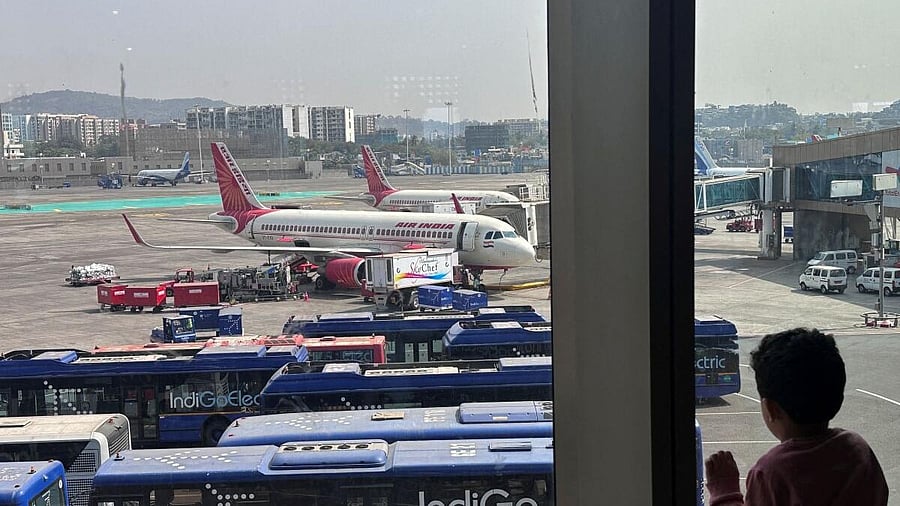
boy looks at Air India airline passenger aircrafts parked at the Chhatrapati Shivaji Maharaj International Airport in Mumbai. (Representative image)
Credit: Reuters Photo
New Delhi: With complaints galore about rising airfare, a Parliamentary panel has recommended empowering DGCA with power to impose a temporary price cap, an AI-powered predictive monitoring system to monitor pricing trends and a mobile App for fliers to report arbitrary fares.
The Parliamentary Standing Committee on Transport, Tourism and Culture also suggested setting up an Aviation Interior Quality Commission to monitor aircraft interiors, taking cue from a complaint raised by Union Minister Shivraj Singh Chouhan about a “broken and sunken” seat in a flight.
In its report on Demand for Grants of the Ministry of Civil Aviation (2025-26), the multi-party panel said the Directorate General of Civil Aviation (DGCA) lacks capacity to proactively monitor and regulate airfare trends and it needs a transformative approach leveraging advanced technology.
The panel headed by senior JD(U) MP Sanjay Jha recommended empowering the DGCA with quasi-judicial authority to “impose temporary price caps or penalties” on airlines “engaging in exploitative practices”. A ‘Pricing Transparency Index’ should be developed to rate airlines on their adherence to fair pricing norms and this information should be made public through a consumer-facing portal, it said.
The panel also wanted the establishment of a “stringent airfare pricing regulation mechanism” – an AI-powered predictive monitoring system, which it wants to call ‘AirPrice Guardian’ – to address consumer grievances on “unpredictable and exorbitant” airfare surges during peak travel periods and emergencies, while ensuring transparency and fairness in pricing practices.
The AI-powered system could utilise machine learning algorithms and predictive analytics to forecast airfare trends based on historical data, demand patterns, fuel costs, seasonal fluctuations, and external factors such as festivals or emergencies, it said.
“By establishing dynamic fare bands for each route, updated quarterly through predictive models, this system will empower regulators to monitor deviations in real-time and take preemptive action against excessive pricing,” it said while suggesting a revamp of the existing Tariff Monitoring Unit (TMU) with AI-driven tools for real-time data analysis and anomaly detection.
Another recommendation was a mobile application ‘Airfare Vigil’, modeled on the Election Commission’s cVIGIL app, to enable citizens to report instances of arbitrary airfare pricing by uploading evidence such as screenshots of ticket prices and contextual details. It should also have features like real-time geo-tagging, automated complaint tracking and time-bound resolution mechanisms.
Taking cognizance of reports concerning premature deterioration of seating materials, ergonomic failures, and technological obsolescence plaguing multiple airlines, the panel also wanted the setting up of Aviation Interior Quality Commission to implement rigorous testing protocols, sustainability guidelines, and accessibility standards across all domestic carriers.
“Sustainability must become a central consideration in interior design and material selection. The Commission would establish progressive environmental standards for cabin interiors, including recyclability requirements, VOC emissions limits, and lifecycle assessment obligations. These standards would align with India’s broader environmental commitments while positioning Indian aviation as a leader in sustainable cabin design,” it said.
In February, Chouhan had targeted Air India for allotting him a "broken and sunken" seat, describing it as an "unethical" practice by the airline to make fliers sit on "bad and uncomfortable" seats after charging them full amount.
